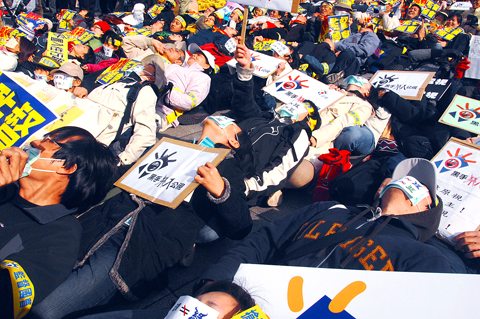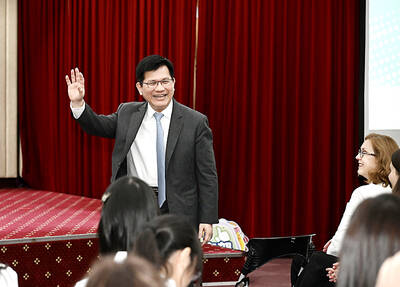Thousands of Taiwan Broadcasting System (TBS) employees and viewers — as well as members of civic groups — took to the streets and formed “human dominoes” outside the Legislative Yuan yesterday to protest against political intervention in media affairs.
“The invisible hand of politics should leave Public Television Service [PTS] alone because it belongs to the public,” Media Watch chairman Kuang Chung-shiang (管中祥) told a crowd gathered on Liberty Square before the start of the parade. “Government institutions such as the Council for Hakka Affairs and the Council of Indigenous Peoples also need to keep their hands off the Hakka and Aboriginal TV stations.”
PTS, Hakka Television Service and Taiwan Indigenous Television Service (TITV) are all affiliates of TBS, which is funded mainly by the government. The law states that the three government-funded channels “belong to the public” and should operate independently.

PHOTO: PATRICK LIN, AFP
However, a resolution proposed by Chinese Nationalist Party (KMT) caucus whip Lin Yi-shih (林益世) and passed last month by a legislative committee states that all TBS program budgets should be reviewed on a case by case basis, raising concern among media reform activists.
The KMT caucus, the Government Information Office (GIO) and the Presidential Office have said that the review will only focus on the budget and not program content. This has failed to convince TBS employees and activists.
“Some lawmakers accused TITV of being anti-[President] Ma Ying-jeou (馬英九), claiming that TITV's news reports only attacked Ma and the Council of Indigenous Peoples,” TITV director Masao Aki said, adding that “part of our budgets were frozen by the legislature in 2007 and last year.”
A Hakka Television Service employee, who declined to be named for fear of retaliation, told the Taipei Times that government intervention was evident.
“They [the Council for Hakka Affairs] want to get their hands on everything. They always have something to say about the content of our news programs, they ‘suggest’ what they want to see in our shows. They have even asked us to change the names of some shows that they didn't like,” the TV employee said.
“The former [Democratic Progressive Party] government did sometimes make comments about our programs, but not as much as the present government,” the employee added. “I'm afraid that the problem will only get worse now that they have a legal basis for controlling our budget.”
The demonstrators held signs and shouted slogans calling for the government to keep its hands off the media as they marched to lay “siege” to the legislature.
After surrounding the legislature, the marchers sat on the ground and formed “human dominoes,” with the participants — each holding a sign that read “Save PTS” — lying back on the people behind them.
Citizens Congress Watch executive director and demonstration organizer Ho Tsung-hsun (何宗勳) said the move symbolized people power pushing against all negative things emanating from the legislature.
GIO Minister Su Jun-pin (蘇俊賓) said yesterday that he had stepped in to mediate disagreements between the two sides, hoping to find a mutually satisfying resolution.
Su, however, refused to comment on whether the KMT-backed resolution constituted political intervention, saying there was “still room for discussion.”
Su also defended the KMT's draft resolution, saying what the party wanted was to ensure that management at PTS would be more transparent.
ADDITIONAL REPORTING BY SHIH HSIU-CHUAN

FIREPOWER: On top of the torpedoes, the military would procure Kestrel II anti-tank weapons systems to replace aging license-produced M72 LAW launchers Taiwan is to receive US-made Mark 48 torpedoes and training simulators over the next three years, following delays that hampered the navy’s operational readiness, the Ministry of National Defense’s latest budget proposal showed. The navy next year would acquire four training simulator systems for the torpedoes and take receipt of 14 torpedoes in 2027 and 10 torpedoes in 2028, the ministry said in its budget for the next fiscal year. The torpedoes would almost certainly be utilized in the navy’s two upgraded Chien Lung-class submarines and the indigenously developed Hai Kun, should the attack sub successfully reach operational status. US President Donald Trump

Taiwan Semiconductor Manufacturing Co (TSMC, 台積電) is expected to start construction of its 1.4-nanometer chip manufacturing facilities at the Central Taiwan Science Park (CTSP, 中部科學園區) as early as October, the Chinese-language Liberty Times (the Taipei Times’ sister newspaper) reported yesterday, citing the park administration. TSMC acquired land for the second phase of the park’s expansion in Taichung in June. Large cement, construction and facility engineering companies in central Taiwan have reportedly been receiving bids for TSMC-related projects, the report said. Supply-chain firms estimated that the business opportunities for engineering, equipment and materials supply, and back-end packaging and testing could reach as high as

ALL QUIET: The Philippine foreign secretary told senators she would not respond to questions about whether Lin Chia-lung was in the country The Ministry of Foreign Affairs on Wednesday confirmed that a business delegation is visiting the Philippines, but declined to say whether Minister of Foreign Affairs Lin Chia-lung (林佳龍) is part of the group, as Philippine lawmakers raised questions over Lin’s reported visit. The group is being led by Deputy Minister of Agriculture Huang Chao-chin (黃昭欽), Chinese International Economic Cooperation Association (CIECA) chairman Joseph Lyu (呂桔誠) and US-Taiwan Business Council (USTBC) vice president Lotta Danielsson, the ministry said in a statement. However, sources speaking on condition of anonymity said that Lin is leading the delegation of 70 people. Filinvest New Clark City Innovation Park

TPP RALLY: The clashes occurred near the Chiang Kai-shek Memorial Hall on Saturday at a rally to mark the anniversary of a raid on former TPP chairman Ko Wen-je People who clashed with police at a Taiwan People’s Party (TPP) rally in Taipei on Saturday would be referred to prosecutors for investigation, said the Ministry of the Interior, which oversees the National Police Agency. Taipei police had collected evidence of obstruction of public officials and coercion by “disorderly” demonstrators, as well as contraventions of the Assembly and Parade Act (集會遊行法), the ministry said in a statement on Sunday. It added that amid the “severe pushing and jostling” by some demonstrators, eight police officers were injured, including one who was sent to hospital after losing consciousness, allegedly due to heat stroke. The Taipei